1776 Born: Sophie Germain, French mathematician and physicist (d. 1831)
Marie-Sophie Germain (1 April 1776 – 27 June 1831) was a French mathematician, physicist, and philosopher. Despite initial opposition from her parents and difficulties presented by society, she gained education from books in her father's library, including ones by Leonhard Euler, and from correspondence with famous mathematicians such as Lagrange, Legendre, and Gauss (under the pseudonym of «Monsieur LeBlanc»). One of the pioneers of elasticity theory, she won the grand prize from the Paris Academy of Sciences for her essay on the subject. Her work on Fermat's Last Theorem provided a foundation for mathematicians exploring the subject for hundreds of years after. Because of prejudice against her sex, she was unable to make a career out of mathematics, but she worked independently throughout her life. Before her death, Gauss had recommended that she be awarded an honorary degree, but that never occurred. On 27 June 1831, she died from breast cancer. At the centenary of her life, a street and a girls’ school were named after her. The Academy of Sciences established the Sophie Germain Prize in her honor
French stamp depicting Sophie Germain
1815 Born: Otto von Bismarck, German lawyer and politician, 1st Chancellor of the German Empire (d. 1898)
Otto Eduard Leopold, Prince of Bismarck, Duke of Lauenburg (Born von Bismarck-Schönhausen; German: Otto Eduard Leopold Fürst von Bismarck, Herzog zu Lauenburg; 1 April 1815 – 30 July 1898), known as Otto von Bismarck, was a conservative Prussian statesman who dominated German and European affairs from the 1860s until 1890 and was the first Chancellor of the German Empire between 1871 and 1890. In 1862, King Wilhelm I appointed him as Minister President of Prussia, a position he would hold until 1890, with the exception of a short break in 1873.
He provoked three short, decisive wars against Denmark, Austria, and France. Following the victory against Austria, he abolished the supranational German Confederation and instead formed the North German Confederation as the first German national state in 1867, leading it as Federal Chancellor. This aligned the smaller North German states behind Prussia. Later receiving the support of the independent South German states in the Confederation's defeat of France, he formed the German Empire in 1871, unifying Germany with himself as Imperial Chancellor, while retaining control of Prussia at the same time. The new German nation excluded Austria, which had been Prussia's main opponent for predominance among the German states.
German First Day Cover issued for the 150 birthday anniversary of Otto von Bismarck
1922 Died: Charles I, emperor of Austria (b. 1887)
Charles I or Karl I (Karl Franz Joseph Ludwig Hubert Georg Otto Maria; 17 August 1887 – 1 April 1922) was the last Emperor of Austria, the last King of Hungary (as Charles IV, Hungarian: IV. Károly), the last King of Bohemia (as Charles III, Czech: Karel III.), and the last monarch belonging to the House of Habsburg-Lorraine before the dissolution of Austria-Hungary. The son of Archduke Otto of Austria and Princess Maria Josepha of Saxony, Charles became heir presumptive of Emperor Franz Joseph after his uncle Archduke Franz Ferdinand of Austria was assassinated in 1914. In 1911, he married Princess Zita of Bourbon-Parma.
Charles succeeded to the thrones in November 1916 following the death of Franz Joseph. He made secret attempts to negotiate Austria-Hungary's exit from the First World War but was unsuccessful. Despite Charles' intention to preserve the empire by transforming it into a federal union, Austria-Hungary headed rapidly towards complete dissolution; Czechoslovakia, the State of Slovenes, Croats and Serbs were proclaimed and Hungary declared to cease her monarchic ties to Austria by the end of October 1918. Following the Armistice of 11 November 1918, Charles "renounced participation" in state affairs, but did not abdicate. The Republic of German-Austria was proclaimed the following day, and in April 1919 he was formally dethroned by the Austrian Parliament and exiled to Switzerland.
Charles spent the remaining years of his life attempting to restore the monarchy. He made two attempts to reclaim the Hungarian throne in 1921; both failed due to a lack of support from Hungary's regent Miklós Horthy. Charles was exiled for a second time to the Portuguese island of Madeira, where he soon fell ill and died of respiratory failure in 1922.
Beatified by Pope John Paul II in 2004, Charles is known to the Catholic Church as Blessed Karl of Austria
Austrian military stamps and Bosnian stamps depicting Karl I
1947 Died: George II, king of Greece (b. 1890)
George II (Greek: Γεώργιος Βʹ, Geórgios II; 19 July 1890 – 1 April 1947) reigned as King of Greece from 1922 to 1924 and from 1935 to 1947. He was a paternal first cousin of Prince Philip, Duke of Edinburgh.
Greek stamps depicting George II

Max Ernst (2 April 1891 – 1 April 1976) was a German (naturalized American in 1948 and French in 1958) painter, sculptor, graphic artist, and poet. A prolific artist, Ernst was a primary pioneer of the Dada movement and surrealism. He had no formal artistic training, but his experimental attitude toward the making of art resulted in his invention of frottage—a technique that uses pencil rubbings of objects as a source of images—and grattage, an analogous technique in which paint is scraped across canvas to reveal the imprints of the objects placed beneath. He is also noted for his novels consisting of collages.
Some stamps from various countries depicting Max Ernst's paintings










No comments:
Post a Comment